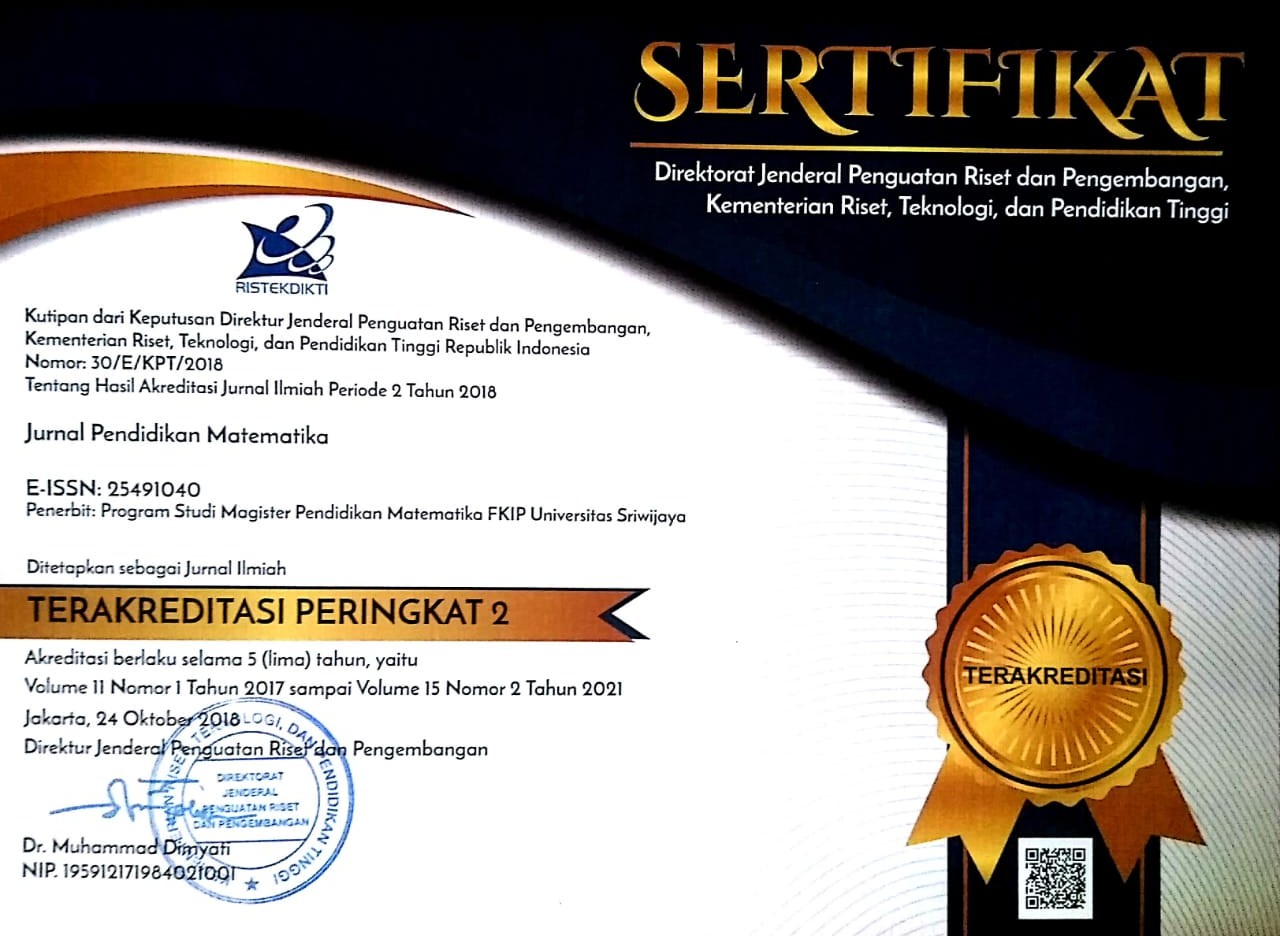Using the Palembang’s Local Context in PISA-Like Mathematics Problem for Analyze Mathematics Literacy Ability of Students
Abstract
This research is descriptive research that aims to describe how the ability of students' mathematical literacy in solving mathematical problems in the PISA model uses the Palembang context. The research subjects were 10th class in senior high school students. The data collection techniques used are written tests, observations, and interviews. The third technique is used to find out what mathematical abilities that arise when students work on mathematical problems in the PISA model using the Palembang context. There are seven mathematical abilities that emerge, such as 84% communication skills; 88,63% mathematical abilities; 100% representation ability; 68,21% reasoning and argument skills; 86,35% ability to choose strategies to solve problems; 70,45% ability to use symbolic, formal language, and techniques and operations; and 68,17% ability to use mathematics tools so that it can be concluded that the 10th class in senior high school students, who were the subjects of the study had mathematical literacy skills that were good enough.
Keywords
Full Text:
PDFReferences
Charmila, N., Zulkardi., & Darmawijoyo. (2016). Developing of PISA mathematics problems using Jambi context [in Bahasa]. Jurnal Penelitian dan Evaluasi Pendidikan, 20(2), 198-207. https://doi.org/10.21831/pep.v20i2.7444.
Dewi, A. I. C., Zulkardi., & Yusuf, M. (2017). Difficulties students in solving problems PISA 2012 level 4, 5, and 6 in SMP N 1 Indralaya [in Bahasa]. Jurnal Pendidikan Matematika, 11(2), 1-15. https://doi.org/10.22342/jpm.11.2.4643.1-15.
Dinni, H. N. (2018). HOTS (High Order Thinking Skills) and their relation to mathematical literacy skills [in Bahasa]. Proceedings of PRISMA 1 (pp. 170-176). Semarang: Universitas Negeri Semarang.
Efriani, A., Putri, R. I. I., & Hapizah. (2018). Row sport context in PISA like mathematics problem. Journal of Education and Learning, 12(4), 757-765. http://dx.doi.org/10.11591/edulearn.v12i4.9113.
Fadholi, T., Waluya, B., & Mulyono. (2015). Analysis of mathematics learning and literacy skills and characteristics of SMK students [in Bahasa]. Unnes Journal of Mathematics Education Research, 4(1), 42-48.
Fatmawati, D., & Ekawati, R. (2016). Developing of PISA-like mathematics problems with change and relationship content for junior high schools [in Bahasa]. Jurnal Ilmiah Pendidikan Matematika, 2(5), 29-38.
Hertiandito, L. T. (2016). Junior high school students' mathematics literacy skills in knisley learning with a learning style review [in Bahasa]. Proceedings of the National Mathematics Seminar on PRISMA (pp. 89-96). Semarang: Universitas Negeri Semarang
Johar, R. (2012). The PISA problem domain for mathematical literacy [in Bahasa]. Jurnal Peluang, 1(1), 30-41.
Jufri, L. H. (2015). Application of double loop problem solving to improve level 3 of mathematical literacy skills in grade VII students of SMPN 27 Bandung [in Bahasa]. Jurnal Lemma, 2(1), 52-62. https://doi.org/10.32502/dikbio.v2i1.1646.
Kadir, K., & Masi, L. (2013). The use of context in mathematics learning to improve the social skills of junior high school students [in Bahasa]. Proceedings of KNPM V Malang (pp. 786–796. Malang: Universitas Negeri Malang.
Khoirudin, A., Setyawati, R. D., & Nursyahida, F. (2017). Profile of sudents’ mathematical literacy ability with the low mathematical ability to solve PISA questions [in Bahasa]. Jurnal Aksioma, 8(2), 33-42. https://doi.org/10.26877/aks.v8i2.1839.
Lange, J. de. (2007). Large-scale assessment and mathematics education. In F. K. Lester (Ed.), Second Handbook of Research on Mathematics Teaching and Learning (pp. 1111–1142). USA: Information Age Publishing Inc.
Mansur, N. (2018). Practicing students' mathematical literacy with PISA questions [in Bahasa]. Proceedings of Prisma 1 (pp. 140-144). Semarang: Universitas Negeri Semarang
Masjaya., & Wardono. (2018). The importance of the ability of mathematical literacy to foster the ability of mathematical connections in improving HR [in Bahasa]. Proceedings of PRISMA 1 (pp. 568-574). Semarang: Universitas Negeri Semarang
Nizar, H., & Putri, R. I. I. (2018). Developing PISA-LIKE mathematics problem using the 2018 Asian games football and table tennis context. Jurnal on Mathematics Education, 9(2), 183-194. https://doi.org/10.22342/jme.9.2.5246.183-194.
OECD. (2010). PISA 2012. Mathematics framework: Draft subject to possible revision after the field trial. Paris: OECD.
OECD. (2013). PISA 2012: Results in focus. Paris: OECD.
OECD. (2016). PISA 2015: Indonesia. Paris: OECD.
OECD. (2016). PISA 2015 Assessment and analytical framework: science, reading, mathematic and financial literacy. Paris: OECD.
Ojose, B. 2011. Mathematics literacy: Are we able to put the mathematics we learn into everyday use. Journal of Mathematics Education, 4(1), 89-100.
Permatasari, R., Putri, R. I. I., & Zulkardi. (2018). PISA-like: Football context in Asian games. Jurnal on Mathematics Education, 9(2), 271-279. https://doi.org/10.22342/jme.9.2.5251.271-280.
Pulungan, D. A. (2014). Developing of PISA mathematical literacy test instruments [in Bahasa]. Journal of Educational Research and Evaluation, 3(2), 74-78.
Putra, Y. Y., Zulkardi., & Hartono, Y. (2016). Developing of PISA-like mathematics problems level 4, 5, 6 using the Lampung context [in Bahasa]. Jurnal Matematika Kreatif dan Inovatif, 7(1), 10-16. https://doi.org/10.15294/kreano.v7i1.4832.
Sari, R. H. N. (2015). Mathematical literacy: What, why and how? [in Bahasa]. Proceedings of National Seminar on Mathematics and Mathematics Education (pp. 713-720).
Setiawan, H., Dafik., & Lestari, N. D. S. (2014). Mathematical problems in PISA have to do with mathematical literacy and higher-order thinking skills [in Bahasa]. Proceedings of National Mathematics Seminar (pp. 245-251). Jember: Universitas Jember.
Simalango, M. M., Darmawijoyo., & Aisyah, N. (2018). Difficulties of students in solving PISA questions on the levels 4, 5, and 6 on the change and relationship content in Indralaya middle school 1 [in Bahasa]. Jurnal Pendidikan Matematika, 12(1), 43-58. https://doi.org/10.22342/jpm.12.1.4246.43-58.
Steen, L.A. (2001). Mathematics and democracy: The case for quantitative literacy. Princeton, NJ: National Council on Education and the Disciplines.
Sudjana, N. 2009. Assessment of results and teaching and learning process [in Bahasa]. Bandung: Remaja Rosdakarya.
Zulkardi., & Putri, R. I. I. (2006). Design mathematical contextual problems [in Bahasa]. Proceeding of the 13th National Mathematics Conference (KNM13). Semarang: Universitas Sebelas Maret.
DOI: https://doi.org/10.22342/jpm.14.2.6708.169-182
Jl. Srijaya Negara, Bukit Besar
Palembang - 30139 Indonesia
Jurnal Pendidikan Matematika is licensed under a Creative Commons Attribution-NonCommercial-ShareAlike 4.0 International License.
Indexed in:


